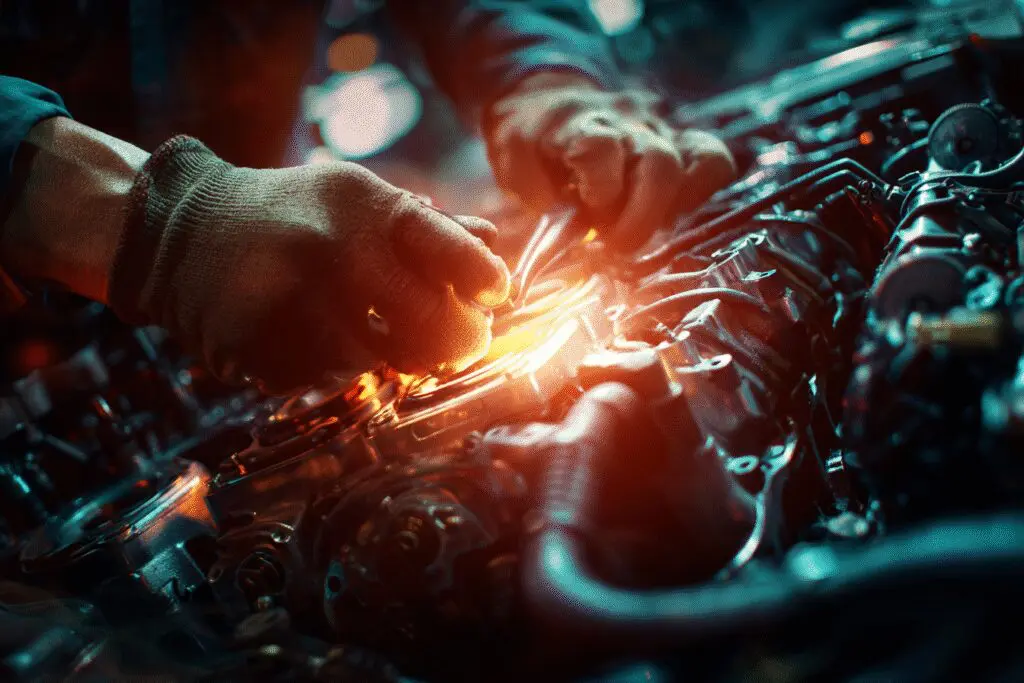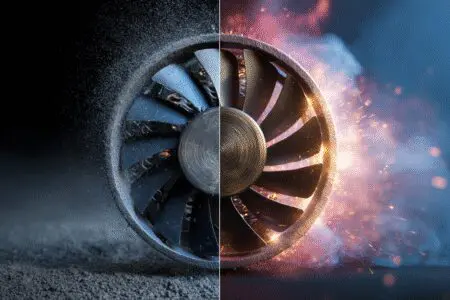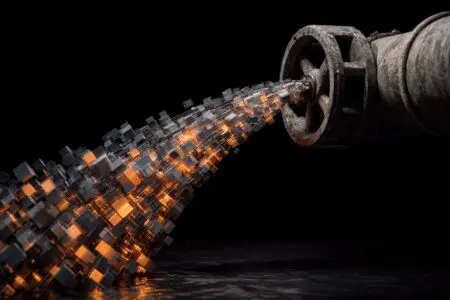Ever felt that frustrating stutter in the middle of an intense firefight, even with a top-tier graphics card? It’s a feeling I know all too well. For years, the gaming community has chanted the mantra, “the GPU is everything.” But here’s a startling truth: in many of today’s fast-paced, complex games, your CPU could be the silent bottleneck holding back your true potential. If you’re looking for an answer to how to increase CPU performance for gaming, you’ve landed in the right place.
We’re not talking about spending hundreds of dollars on a new processor. Instead, we’re going to dive deep into the heart of your existing CPU and learn how to unleash its full power, primarily by focusing on its boost clock.
Think of this as a tuning guide for the engine of your gaming rig. We’ll cover everything from simple software tweaks in Windows to the nitty-gritty of your motherboard’s BIOS, all with the goal of getting you more frames per second (FPS) and a smoother, more responsive gaming experience. This is about extracting every last drop of performance from the hardware you already paid for.
More in Gaming Performance & Optimization Category
How to Optimize Windows 11 for Gaming
What Exactly Is a CPU Boost Clock and Why Should Gamers Care?
First things first, let’s demystify some terminology. Every modern CPU has two key speeds: a “base clock” and a “boost clock.”
Imagine you’re just browsing the web or typing in a document. Your CPU is coasting along at its base clock, a comfortable and power-efficient speed. It’s like your car’s engine idling at a stoplight.
But the moment you launch a demanding game like Starfield or Baldur’s Gate 3, your CPU gets the signal to floor it. This is where the boost clock comes in. It’s the maximum speed your processor can achieve for a short period to handle intense workloads. AMD calls its technology “Precision Boost,” while Intel has “Turbo Boost” and “Thermal Velocity Boost.” They all do basically the same thing: opportunistically ramp up the speed when conditions are right.
For gamers, this matters immensely. A higher boost clock means your CPU can perform more calculations per second. This is critical for:
- Game Logic and AI: Managing all the complex rules, character behaviors, and events happening in the game world.
- Physics Simulations: Calculating realistic explosions, cloth movement, and environmental destruction.
- Feeding the GPU: Preparing the data (draw calls) that your graphics card needs to render frames. In high-FPS scenarios, a slow CPU can’t feed the GPU fast enough, leading to a bottleneck and lower frame rates.
I remember the first time I really understood this. I was playing Cyberpunk 2077 in a crowded market area, and my frames were tanking. I opened a monitoring tool and saw my CPU’s clock speed jumping up and down. It wasn’t consistently hitting its advertised boost. That’s when I realized that just having a high boost clock on the box isn’t enough; you need to create the right environment for your CPU to actually use it.
Before You Tweak Anything: How Do You Check Your Current CPU Performance?
Before we start tuning, we need a starting line. You absolutely must establish a baseline for your system’s performance. Why? Because you can’t improve what you don’t measure. This step is non-negotiable.
What are the Best Free Tools for Monitoring Your CPU in-game?
To see what your CPU is doing in real-time, you need an on-screen display. The gold standard for this is a combination of two free programs:
- MSI Afterburner: Don’t let the name fool you; it works with any brand of hardware. It’s primarily a GPU tool, but it’s the gateway to what we really need.
- RivaTuner Statistics Server (RTSS): This gets installed alongside Afterburner and is the software that actually puts the stats on your screen.
In Afterburner’s settings, you can choose which metrics to show, such as CPU clock speed, overall CPU usage, per-core CPU usage, and—most importantly—CPU temperature. I highly recommend monitoring all of these. Seeing your clock speed and temperature side-by-side tells a powerful story.
For a more detailed look when you’re not in a game, tools like HWiNFO64 or HWMonitor are fantastic. They provide an overwhelming amount of data, but they’re perfect for checking maximum temperatures and clock speeds after a gaming session.
How Do You Run a Quick Benchmark to See Where You Stand?
Once you have your monitoring set up, you need a consistent test. This allows you to make one change at a time and see if it actually made a positive difference.
Many modern games have excellent built-in benchmark tools. Games like Shadow of the Tomb Raider, Gears 5, Horizon Zero Dawn, and F1 23 have repeatable tests that give you a detailed performance report. Run the benchmark two or three times and average the results. Write this number down!
Additionally, it’s a good idea to run a synthetic benchmark that tests raw CPU power, independent of your GPU. The best free option here is Cinebench R23. It runs a 10-minute stress test and gives your CPU a score. I always run Cinebench after a new build, and then again six months later just to see if dust buildup is impacting my thermals and, consequently, my scores. It’s a quick and reliable health check for your processor.
The Low-Hanging Fruit: Are Simple Windows Settings Holding Your CPU Back?
Alright, with our baseline established, let’s start with the easiest possible wins. You might be surprised to find that some default Windows settings are designed more for power-saving than for maximum gaming performance. Let’s fix that.
Have You Checked Your Windows Power Plan?
By default, Windows uses a “Balanced” power plan. This plan is designed to save energy by reducing your PC’s performance when it doesn’t think you need it. This can sometimes cause a delay in your CPU ramping up to its full boost clock, which can introduce micro-stutters in games.
The fix is simple:
- Press the Windows key and type “Choose a power plan.”
- In the Control Panel window that opens, you’ll likely see “Balanced” selected.
- Click “Show additional plans” and select “High Performance.”
Some systems might even have an “Ultimate Performance” plan, which is even more aggressive. Switching to a performance-oriented plan tells Windows to keep your CPU in a higher state of readiness, allowing it to hit its boost clock faster and more consistently. The trade-off is slightly higher idle power consumption, but for a gaming rig, it’s a worthy one.
Are Unnecessary Background Apps Stealing Your CPU Cycles?
This one seems obvious, but its impact is often underestimated. Every application running in the background is taking a small slice of your CPU’s attention. When you’re gaming, you want 100% of that attention focused on the game.
Before you launch a game, get in the habit of closing everything you don’t need. This means web browsers (especially if you have dozens of tabs open), Discord (unless you’re actively using it), and other game launchers like Steam or the Epic Games Store if you’re not playing a game from them.
More importantly, you should check what programs are launching automatically when you start your PC.
- Press Ctrl + Shift + Esc to open the Task Manager.
- Click on the “Startup” tab.
- Look through the list and disable anything you don’t need running immediately upon boot-up. Things like update checkers for various programs or software for peripherals can often be disabled without any negative effects.
It’s wild how many resources some of these seemingly harmless background apps can eat up. I once helped a friend who was complaining about poor performance, and we discovered their RGB lighting software was using a consistent 5% of their CPU. Shutting it down resulted in a noticeable improvement in game smoothness.
The Cooling Factor: Is Heat the Real Enemy of Your CPU’s Boost Clock?
Now we get to the most common culprit behind underperforming CPUs: heat. There’s a physical limit to how hot a processor can get before it starts to damage itself. To prevent this, all CPUs have a built-in safety mechanism called thermal throttling.
Think of it like a marathon runner. If they push too hard, their body temperature rises. To avoid overheating, they have to slow down. Your CPU does the exact same thing. When it hits a certain temperature (often around 95-100°C), it will automatically reduce its clock speed to cool down. This means your precious boost clock disappears, and your in-game performance tanks.
The relationship between temperature and processor performance isn’t just anecdotal; it’s a fundamental principle of semiconductor physics. In fact, research from institutions like Purdue University has explored these thermal constraints in-depth, showing how crucial cooling is for sustained performance. Your goal as a gamer is to give your CPU as much thermal headroom as possible.
How Can You Tell if Your CPU is Overheating?
This is where our monitoring software comes back into play. While you’re gaming, keep an eye on your CPU temperature. If you see it consistently hitting the low-to-mid 90s Celsius, you are almost certainly thermal throttling and leaving performance on the table. Ideally, you want your CPU to stay below 85°C under a heavy gaming load to ensure it can maintain its maximum boost clock indefinitely.
What are the Easiest Ways to Improve Your CPU Cooling Right Now?
If you suspect heat is your problem, don’t worry. There are several effective and often free ways to solve it.
- Clean Your PC: This is the big one. Over time, dust clogs up your fans and the fins of your CPU cooler’s heatsink, acting like an insulating blanket. Get a can of compressed air and (carefully!) blow the dust out. Make sure to hold the fans in place with your finger so they don’t spin too fast. You should do this every few months.
- Improve Case Airflow: A PC case needs to breathe. A common mistake is having fans set up incorrectly. The basic concept is simple: you want a clear path for air to travel through your case. Generally, fans at the front and bottom should be set as intakes (pulling cool air in), while fans at the rear and top should be set as exhausts (pushing hot air out).
- Re-apply Thermal Paste: This is a slightly more advanced step, but it’s essential for builds that are more than a couple of years old. The thermal paste between your CPU and its cooler can dry out and lose effectiveness. Replacing it is a cheap and incredibly effective way to lower temps. I make it a habit to re-paste my CPU every two years. The difference is often a surprising 5-10°C drop, which is huge for maintaining boost clocks.
Unlocking Full Potential in the BIOS: A Gamer’s Guide to Key Settings
We’ve handled the software and the physical environment. Now, it’s time to head into the command center of your PC: the BIOS (or UEFI, on modern systems).
Entering the BIOS can feel like opening the hood of a sports car. It’s powerful, and changing the wrong setting can cause instability. However, don’t be intimidated. We’re going to stick to a couple of the safest and most impactful settings that can give you a significant performance boost. To enter your BIOS, you typically need to press a key like Delete, F2, or F12 right after you turn your computer on.
What is Multi-Core Enhancement (MCE) and Should You Enable It?
On many motherboards (especially Intel-based ones from ASUS), you’ll find a setting called “Multi-Core Enhancement” or something similar. Normally, a CPU’s maximum boost clock only applies when one or two cores are active. When all cores are being used, they run at a slightly lower speed.
MCE throws that rule out the window. It essentially tells your CPU to run all of its cores at the maximum single-core boost clock, all the time. The upside is a massive, immediate jump in multi-core performance. The downside is a significant increase in heat and power consumption. You should only enable this setting if you have a robust cooling solution (like a large air cooler or an AIO liquid cooler) and a good quality power supply. If your cooling can’t keep up, MCE will just lead to more thermal throttling.
How Do You Safely Enable XMP or DOCP for Your RAM?
This is arguably the single most important setting to enable in your BIOS for gaming performance. Your CPU needs to communicate with your RAM constantly. If your RAM is running slow, it can’t get data to the CPU fast enough, creating a bottleneck.
When you buy RAM advertised at, say, 3600MHz, it doesn’t run at that speed out of the box. It defaults to a much slower, standardized speed. To unlock its full potential, you need to enable its built-in overclocking profile.
- On Intel systems, this is called XMP (Extreme Memory Profile).
- On AMD systems, it’s called DOCP (Direct Overclock Profile) or now EXPO.
In your BIOS, usually on the main or “tweaker” page, you’ll find this setting. It’s typically a simple one-click change from “Disabled” to “Profile 1.” Enabling this can lead to a 10-15% improvement in CPU-bound gaming scenarios. It is a massive, free performance upgrade that too many gamers leave on the table.
The Software Side: Are Your Drivers and Game Settings Optimized?
Finally, let’s circle back to software. Keeping your system’s core components up-to-date and understanding how in-game settings affect your CPU can provide that final bit of polish to your gaming experience.
Does Updating Your Chipset Driver Really Matter?
Absolutely, yes. While everyone remembers to update their graphics drivers, chipset drivers are often forgotten. These drivers control how your CPU communicates with every other part of your motherboard—your RAM, your storage drives, your USB ports.
Updated chipset drivers can improve system stability, storage performance, and crucially, the power management logic that controls your CPU’s boost behavior. Do not rely on Windows Update for this. Go directly to the AMD or Intel website, find the support page for your specific chipset (e.g., AMD B550 or Intel Z790), and download the latest version.
Which In-Game Settings are Most CPU-Intensive?
If you’ve done everything else and still find yourself CPU-bound in certain games, you can gain back some performance by targeting the settings that hit the CPU the hardest. Unlike texture quality or resolution, which are almost entirely GPU-dependent, some settings rely heavily on the CPU for calculations.
If you need a few extra frames, try lowering these specific settings first:
- Shadow Quality: Calculating complex, dynamic shadows can be surprisingly tough on a CPU.
- Object Detail / View Distance: The farther out you can see and the more objects the game has to keep track of, the more work your CPU has to do.
- Physics Simulations: Any setting related to advanced physics or particle effects.
- Population Density: In open-world games like Cyberpunk 2077 or the Assassin’s Creed series, this setting is a notorious CPU-killer. Lowering the number of NPCs on screen can provide a huge performance uplift.
Your Path to More Frames
Boosting your CPU’s gaming performance isn’t about one magic bullet. It’s a systematic process of identifying and removing the limitations that are holding it back. By starting with a baseline, you can methodically work through the easy wins in Windows, ensure your cooling is up to the task, and then unlock your hardware’s true potential with safe BIOS settings like XMP.
Getting that extra 10-15% performance out of the hardware you already own is one of the most satisfying parts of PC gaming. It transforms you from just a user into a tuner who understands the machine you’ve built. Now, go apply what you’ve learned and get those extra frames you deserve.
Frequently Asked Questions – How to Increase CPU Performance for Gaming

How can I improve CPU performance for gaming through software adjustments?
Closing unnecessary background applications, switching to the High Performance power plan, and enabling Windows Game Mode are effective software methods to boost CPU performance for gaming.
When should I consider overclocking my CPU, and what precautions should I take?
Overclocking is suitable when hardware supports it and you need extra speed. It requires an unlocked CPU, compatible motherboard, robust cooling, and careful voltage adjustments while monitoring temperatures to prevent damage.
What are common reasons a CPU may perform slowly in games?
The main reasons include overheating causing thermal throttling, other programs consuming CPU resources, outdated BIOS or chipset drivers, and insufficient hardware specifications.
What do CPU cores, threads, and clock speed mean, and why are they important for gaming?
Cores are individual processing units within a CPU, threads help organize tasks, and clock speed indicates how many tasks the CPU can perform per second; a good combination improves gaming performance, especially in modern, multi-core optimized games.
Why is my CPU so important for gaming performance?
Your CPU is crucial because it handles game logic, AI, physics calculations, and data preparation for the graphics card, directly affecting game smoothness and responsiveness.




